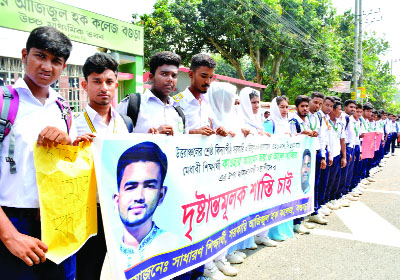
BSS, Rajshahi :
Experts and development activists here called for protecting the existing surface water resources including rivers in Barind area.
They said recommendations and suggestions from the grassroots level farmers, researchers and other stakeholders need to be taken into consideration before formulating any water related law and policy.
Issues of vulnerabilities caused by abnormal declining of underground and surface water resources have become a grave concern. Protecting the rivers is the precondition to mitigating the water crises in the drought-prone Barind area, they added.
The observation came at a meeting held at Tanore Upazila Complex Shaheed Minar in the district on Sunday. Bangladesh Resource Centre for Indigenous Knowledge (BARCIK), and Shiba and Baronoy rivers Protection Sangram Parishad jointly organised the meeting to mark the World River Day-2018.
Earlier, large number of youths took part in a 60-kilometer cycling campaign from Rajshahi city to create mass-awareness about rivers. After crossing some rivers they ended the campaign at the meeting venue.
Upazila Chairman Bondona Rani Pramanik, Upazila Nirbahi Officer Chowdhury Golam Rabbi, Assistant Engineer of Barind Multipurpose Development Authority Shariful Islam, BARCIK Regional Coordinator Shahidul Islam and National Agriculture Awarded farmers Nur Muhammad and Yousuf Ali Mollah, among others, addressed the meeting.
Bondona Rani said the climate change has been depleted the natural resources and become major threat to humanity. She urged the policy makers to take effective measures to address the adverse impact.
Substantial and sustainable promotion of water and sanitation related modern technologies have become the demand of time. The existing rivers need to be brought under excavation immediately.
Bondona Pramanik added the dry area experiencing drought like conditions with gradual increase of extreme weather conditions, sharp declining in groundwater table and decreasing rate of rainfall.
She puts emphasis on groundwater recharging by enriching the surface water resources through necessary excavation and re-excavation of the derelict ponds and canals on an urgent basis.
Experts and development activists here called for protecting the existing surface water resources including rivers in Barind area.
They said recommendations and suggestions from the grassroots level farmers, researchers and other stakeholders need to be taken into consideration before formulating any water related law and policy.
Issues of vulnerabilities caused by abnormal declining of underground and surface water resources have become a grave concern. Protecting the rivers is the precondition to mitigating the water crises in the drought-prone Barind area, they added.
The observation came at a meeting held at Tanore Upazila Complex Shaheed Minar in the district on Sunday. Bangladesh Resource Centre for Indigenous Knowledge (BARCIK), and Shiba and Baronoy rivers Protection Sangram Parishad jointly organised the meeting to mark the World River Day-2018.
Earlier, large number of youths took part in a 60-kilometer cycling campaign from Rajshahi city to create mass-awareness about rivers. After crossing some rivers they ended the campaign at the meeting venue.
Upazila Chairman Bondona Rani Pramanik, Upazila Nirbahi Officer Chowdhury Golam Rabbi, Assistant Engineer of Barind Multipurpose Development Authority Shariful Islam, BARCIK Regional Coordinator Shahidul Islam and National Agriculture Awarded farmers Nur Muhammad and Yousuf Ali Mollah, among others, addressed the meeting.
Bondona Rani said the climate change has been depleted the natural resources and become major threat to humanity. She urged the policy makers to take effective measures to address the adverse impact.
Substantial and sustainable promotion of water and sanitation related modern technologies have become the demand of time. The existing rivers need to be brought under excavation immediately.
Bondona Pramanik added the dry area experiencing drought like conditions with gradual increase of extreme weather conditions, sharp declining in groundwater table and decreasing rate of rainfall.
She puts emphasis on groundwater recharging by enriching the surface water resources through necessary excavation and re-excavation of the derelict ponds and canals on an urgent basis.

